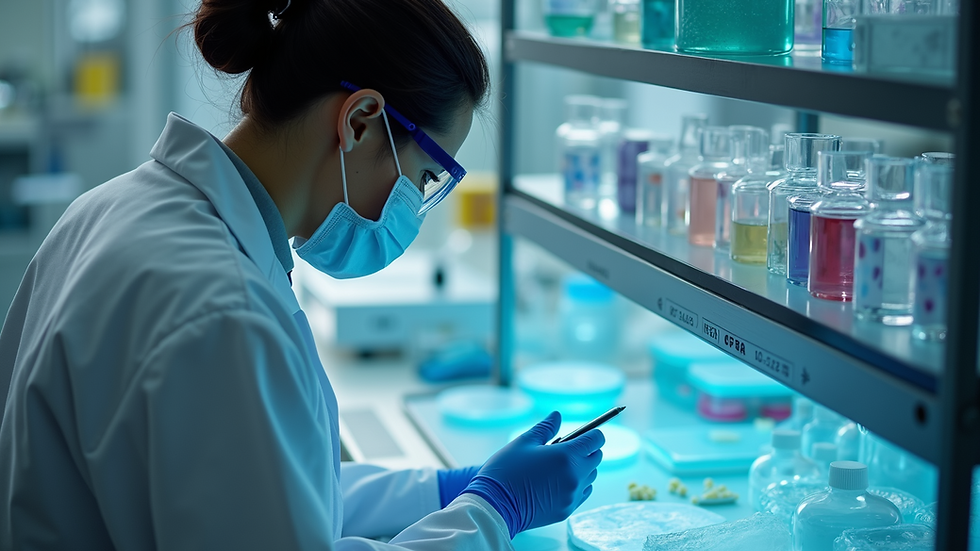The Therapeutic Potential of MSC Exosome Applications
- Mike Hinshaw

- Aug 1, 2025
- 4 min read
Mesenchymal stem cells (MSCs) have been a focal point in regenerative medicine for years. Recently, the spotlight has shifted towards MSC-derived exosomes, tiny vesicles that carry powerful therapeutic molecules. These MSC therapeutic exosomes offer promising new avenues for treating a variety of diseases and injuries. This article explores their potential, mechanisms, and practical applications.
Understanding MSC Therapeutic Exosomes and Their Importance
MSC therapeutic exosomes are small extracellular vesicles secreted by mesenchymal stem cells. These vesicles contain proteins, lipids, and nucleic acids that can influence the behavior of recipient cells. Unlike stem cells themselves, exosomes do not replicate or differentiate, which reduces the risk of complications such as tumor formation.
The importance of MSC therapeutic exosomes lies in their ability to mediate cell-to-cell communication and modulate immune responses. They can promote tissue repair, reduce inflammation, and support regeneration without the complexities of cell transplantation.
Key benefits of MSC therapeutic exosomes include:
Low immunogenicity, making them safer for allogeneic use
Ability to cross biological barriers, such as the blood-brain barrier
Stability in circulation, allowing for effective delivery to target tissues
Potential for large-scale production and storage
These features make MSC therapeutic exosomes a versatile tool in modern medicine.

What are MSC exosomes?
MSC exosomes are nano-sized vesicles, typically 30-150 nanometers in diameter, released by mesenchymal stem cells. They are part of the cell’s natural communication system, carrying molecular messages to other cells. These messages include microRNAs, messenger RNAs, proteins, and lipids that can alter the recipient cell’s function.
Exosomes are formed inside the cell within multivesicular bodies and released into the extracellular space. Once released, they travel through bodily fluids such as blood, saliva, and urine, reaching distant sites to exert their effects.
The cargo inside MSC exosomes is tailored by the parent cell’s environment and condition. For example, MSCs exposed to inflammatory signals produce exosomes enriched with anti-inflammatory molecules. This adaptability makes MSC exosomes highly effective in responding to different pathological conditions.
Examples of MSC exosome functions:
Immune modulation: They can suppress overactive immune responses, which is useful in autoimmune diseases.
Tissue regeneration: They promote the growth of new blood vessels and repair damaged tissues.
Neuroprotection: MSC exosomes support neuron survival and reduce neuroinflammation.
Because of these properties, MSC exosomes are being studied for applications in cardiovascular diseases, neurodegenerative disorders, wound healing, and more.

Therapeutic Applications of MSC Exosomes
The therapeutic potential of MSC exosomes spans multiple medical fields. Their ability to deliver bioactive molecules directly to damaged or diseased tissues opens new treatment possibilities.
1. Regenerative Medicine
MSC exosomes promote tissue repair by stimulating cell proliferation and angiogenesis (formation of new blood vessels). For example, in skin wound healing, exosomes accelerate closure and reduce scarring by modulating inflammation and enhancing collagen synthesis.
In bone and cartilage repair, MSC exosomes encourage the differentiation of progenitor cells into osteoblasts and chondrocytes, aiding recovery from fractures and osteoarthritis.
2. Neurological Disorders
Neurological diseases such as stroke, Alzheimer’s, and Parkinson’s disease involve inflammation and neuronal loss. MSC exosomes can cross the blood-brain barrier and deliver neuroprotective factors that reduce inflammation and promote neuron survival.
Studies have shown that MSC exosomes improve functional recovery after stroke by enhancing neurogenesis and reducing brain tissue damage.
3. Cardiovascular Diseases
Heart attacks cause irreversible damage to cardiac tissue. MSC exosomes help by promoting angiogenesis and reducing fibrosis in the heart muscle. They also modulate immune responses to prevent excessive inflammation after injury.
Animal models of myocardial infarction treated with MSC exosomes show improved heart function and reduced scar size.
4. Immune Modulation and Inflammation
MSC exosomes have potent immunomodulatory effects. They can suppress the activation of T cells, B cells, and natural killer cells, making them useful in treating autoimmune diseases and preventing transplant rejection.
For example, in graft-versus-host disease (GVHD), MSC exosomes reduce inflammation and improve patient outcomes.

Practical Recommendations for Exploring MSC Exosome Therapy
If you are considering MSC exosome therapy or research, here are some practical tips:
Choose reputable sources: Work with certified labs or companies specializing in MSC exosome production.
Understand the application: Different diseases may require tailored exosome preparations.
Monitor clinical trials: Stay updated on ongoing studies to learn about safety and efficacy data.
Consider combination therapies: MSC exosomes may work best alongside other treatments.
Consult experts: Collaborate with clinicians and researchers experienced in regenerative medicine.
For those interested in exploring msc exosome therapy, partnering with established providers ensures access to high-quality products and expert guidance. Contact us if you would like to know more about our partnership network.
Looking Ahead: The Future of MSC Therapeutic Exosomes
The field of MSC therapeutic exosomes is rapidly evolving. As research advances, these tiny vesicles could revolutionize how we treat a wide range of conditions. Their unique ability to harness the healing power of stem cells without the risks of cell transplantation makes them a compelling option.
Future developments may include personalized exosome therapies, improved delivery systems, and integration with gene editing technologies. With continued innovation and rigorous clinical testing, MSC therapeutic exosomes have the potential to become a cornerstone of regenerative medicine and targeted therapy.
The journey from bench to bedside is underway, and the promise of MSC exosomes is only beginning to unfold.




Comments